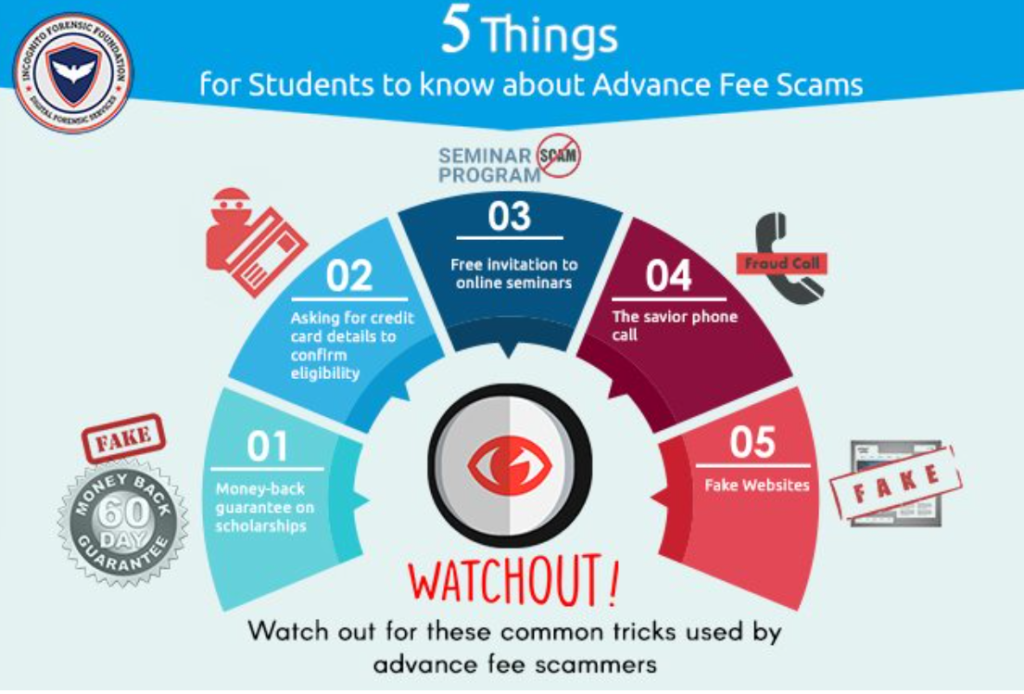What are Advance Fee Schemes?
Advance Fee Schemes are a type of fraud that involve criminals promising victims large sums of money or other rewards if they agree to pay a small up-front payment. These types of scams are usually long-term and involve gaining the victim’s trust before carrying out the scam.

One of the earliest examples of such scams is the Spanish Prisoner scam that originated in the late 18th/early 19th century. The scam involved criminals pretending to be wealthy men imprisoned in Spain under false identities. In exchange for money to help get them released, they promised victims great monetary rewards. A more well known example of an advanced fee scheme is the Nigerian prince scam (also known as 419 scheme). It involves scammers contacting victims either via email or post and claiming that if they help with transferring large sums of money out of Nigeria, they would get to keep as much as 30% of the sum. Once victims fall for it, the scammers start asking for money to cover supposedly unexpected expenses, such as lawyer fees or bribes.
All advanced fee schemes end the same, victims send thousands of dollars but receive none of the promised money.
How do advanced fee scams happen?
Scammers make initial contact using email, social media and instant messaging services. Letters via post were popular for a long time but communication using more convenient means like email is now more prevalent. The scammers introduce themselves as someone who has a large sum of money but cannot access it for one reason or another, hence why they are contacting the recipient. They may claim to be a government or bank employee, a lawyer, a widow/widower, etc. A classic example is a scammer pretending to be a lawyer with a wealthy client who has passed away without leaving a will or a next of kin.
If the recipient, tempted by the promises of millions of dollars, responds positively, scammers will try to build a trust-based relationship and slowly start asking for money. For example, a scammer carrying out a Nigerian prince scam may claim that they need money to bribe a bank employee. Then request more money to bribe someone else. This usually goes on until the victim realises what’s going on or loses all their money. In some cases, if scammers believe the victim to be hesitant or doubtful, they would send fake documents proving their cases, as well as apply psychological pressure.
In order to avoid allowing victims to get their money back, scammers ask for the money to be transferred via services like WesternUnion or Money Gram. International transfers cannot be reversed or cancelled. Cryptocurrency transfers are also becoming more common these days.
Advanced fee scams don’t always involve scammers pretending to be wealthy individuals looking to share their money. There are plenty of other types, such as employment scams, lottery scams, pet scams, and romance scams.
An employment advanced fee scam involves scammers approaching individuals looking for jobs and offering high-paying positions in fake companies. Scammers usually contact people who post their résumés on various job sites. They contact potential victims with a high salary employment offer, and if victims are interested, scammers direct them to government officials who would supposedly provide the necessary work permit to the victim. However, the victim would then be asked to pay for the supposed permit. In some cases, scammers approach freelancers with assignments but ask for an advanced payment before the assignment can be sent.
Lottery advanced fee scams involve scammers contacting victims to inform them about fake lottery winnings, to receive which victims would have to send their personal information (full name, home address, phone number, etc.), as well as a small “winners” fee.
How to avoid falling for advanced fee schemes
- Opportunities that seem too good to be true probably are just that.
It goes without saying that if someone emails you offering millions of dollars if you help them, it’s a scam. Same goes for lotteries you did not enter into, or job opportunities that promise large sums of money if you invest a small amount. Generally, if something seems to too good to be true, it probably is.
- Always look into the people/businesses you plan to deal with.
If you are ever approached with a job offer or a business opportunity that requires you to make an up-front investment, be very skeptical. Always look into the person/business that has approached you and make sure they are legitimate. Do various research, visit the business location, consult with your bank or a lawyer before making any big financial decisions like transferring large sums of money. Be wary if the business does not have a street address.
- Do not enter into any agreement if you do not fully understand it.
If you are approached with a business opportunity, make sure you understand the agreement fully before committing. It’s always recommended to consult with a competent lawyer before committing to any business agreements.
Additional Information
Updated Investor Alert: Be on the Lookout for Advance Fee Fraud
Investor Alert: Be on the Lookout for Advance Fee Fraud
Investor Alert: Beware of Government Impersonators Targeting Fraud Victims